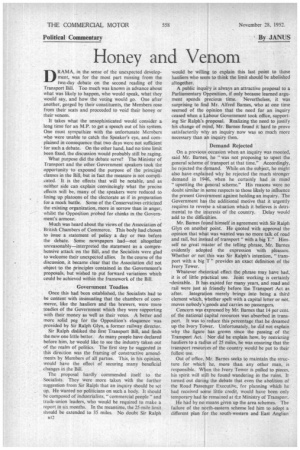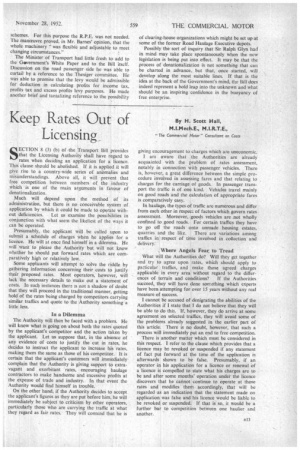Honey and Venom
Page 46

Page 47

If you've noticed an error in this article please click here to report it so we can fix it.
DRAMA, in the sense of the unexpected development, was for the most part missing from the two-day debate on the second reading of the Transport Bill. Too much was known in advance about what was likely to happen, who would speak, what they would say, and how the voting would go. One after another, gorged by their constituents, the Members rose from their seats and proceeded to void their honey or their venom.
It takes what the unsophisticated would consider a long time for an M.P. to get a speech out of his system. One must sympathize with the unfortunate Members who were unable to catch the Speaker's eye, and complained in consequence that two days were not sufficient for such a debate. On the other hand, had no time limit been fixed, the discussion would probably still be raging.
What purpose did the debate serve? The Minister of Transport and the other Government speakers took the opportunity to expound the purpose of the principal clauses in the Bill, but in fact the measure is not complicated. It is the effects that will be notable, and as neither side can explain convincingly what the precise effects will be, many of the speakers were reduced to lining up platoons of the electorate as if in preparation for a mock battle. Some of the Conservatives criticized the existing organization, more in sorrow than in anger, whilst the Opposition probed for chinks in the Government's armour.
• Much was heard about the views of the Association of British Chambers of Commerce. This body had chosen to issue a statement of policy a day or two before the debate. Some newspapers had—not altogether unreasonably—interpreted the statement as a comprehensive attack on the Bill, and the Socialists were glad to welcome their unexpected allies. In the course of the discussion, it became clear that the Association did not object to the principles contained in the Government's proposals, but wished to put forward variations which could be achieved within the framework of the Bill.
Government Toadies
Once this had been established, the Socialists had to be content with insinuating that the chambers of commerce, like the hauliers and the brewers, were mere toadies of the Government which they were supporting with their money as well as their votes. A better and more solid peg for the Opposition's eloquence was provided by Sir Ralph Glyn, a former railway director.
Sir Ralph disliked the first Transport Bill, and finds the new one little better. As many people have declared before him, he would like to see the industry taken out of the realm of politics. The first step he suggested in this direction was the framing of constructive amendments by Members of all parties. This, in his opinion, would have the effect of securing many beneficial changes in the Bill.
The proposal hardly commended itself to the Socialists. They were more taken with the further suggestion from Sir Ralph that an inquiry should be set up. He wanted no politicians on such a body. It should be composed of industrialists, "commercial people" and trade-union leaders, who would be required to make a report in six months. In the meantime, the 25-mile limit should be extended to 35 miles. No doubt Sir Ralph would be willing to explain this last point to those hauliers who seem to think the limit should be abolished altogether.
A public inquiry is always an attractive proposal to a Parliamentary Opposition, if only because learned argument spends precious time. Nevertheless, it was surprising to find Mr. Alfred Barnes, who at one time seemed of the opinion that the need for an inquiry ceased when a Labour Government took office, supporting Sir Ralph's proposal. Realizing the need to justify hi S change of mind, Mr. Barnes found it hard to prove satisfactorily why an inquiry now was so much more necessary than an inquiry then.
Demand Rejected
On a previous occasion when an inquiry was mooted, said Mr. Barnes, he "was not proposing to upset the general scheme of transport at that time." Accordingly, he rejected the demand. While on the subject, he might also have explained why he rejected the much stronger demand in 1946, when he certainly had in mind "upsetting the general scheme." His reasons were no doubt similar in some respects to those likely to influence the present Government against holding an inquiry. The Government hai the additional motive that it urgently requires to reverse a situation which it believes is detrimental to the interests of the country. Delay would add to the difficulties.
Mr. Barnes found himself in agreement with Sir Ralph Glyn on another point. He quoted with approval the opinion that what was wanted was no more talk of road and rail, but instead of transport " with a big T." Himself no great master of the telling phrase, Mr. Barnes evidently adopted the expression with pleasure. Whether or not this was Sir Ralph's intention, "transport with a big T" provides an exact definition of the Ivory Tower.
Whatever rhetorical effect the phrase may have had, it is of little practical use. Joint working is certainly -desirable. It his existed for many years, and road and rail were just a friendly before the Transport Act as after. Integration merely brings into being a third element which, whether spelt with a capital letter or not, moves nobody's goods and carries no passengers.
Concern was expressed by Mr. Barnes that 14 per cent. of the national capital resources was absorbed in transport. It was to reduce this percentage that he dreamed up the ivory Tower. Unfortunately, he did not explain why the figure has grown since the passing of the Transport Act. Nor did he explain how, by restricting hauliers to a radius of 25 miles, he was ensuring that the transport resources of the country would be put to their fullest use.
Out of office, Mr. Barnes seeks to maintain the structure for which he, more than any other man, is responsible. When the Ivory Tower is pulled to pieces, his spirit will still be found wandering in the ruins. It turned out during the debate that even the abolition of the Road Passenger ExecutiVe, for planning which he had received some little credit, would have been only temporary had he remained at the Ministry of Transport.
He had by no means given up the area schemes. The failure of the north-eastern scheme led him to adopt a different plan for the south-western and East Anglian schemes. For this purpose the R.P.E. was not needed. The manceuvre proved, in Mr. Barnes' opinion, that the whole machinery " was flexible and adjustable to meet changing circumstances."
The Minister of Transport had little fresh to add to the Government's White Paper and to the Bill itself. Discussion on the road passenger side he was able to curtail by a reference to the Thesiger committee. He was able to promise that the levy would be admissible for deduction in calculating profits for income tax, profits tax and excess profits levy purposes. He made another brief and tantalizing reference to the possibility of clearing-house organizations which might be set up at some of the former Road Haulage Executive depots.
Possibly the sort of inquiry that Sir Ralph Glyn had in mind may take place spontaneously when the new legislation is being put into effect. It may be that the process of denationalization is not something that can be charted in advance, but that, once started, will develop along the most suitable lines. If that is the idea at the back of the Government's mind, the Bill does indeed represent a bold leap into the unknown and what should be an inspiring confidence in the buoyancy of free enterprise.




















































































